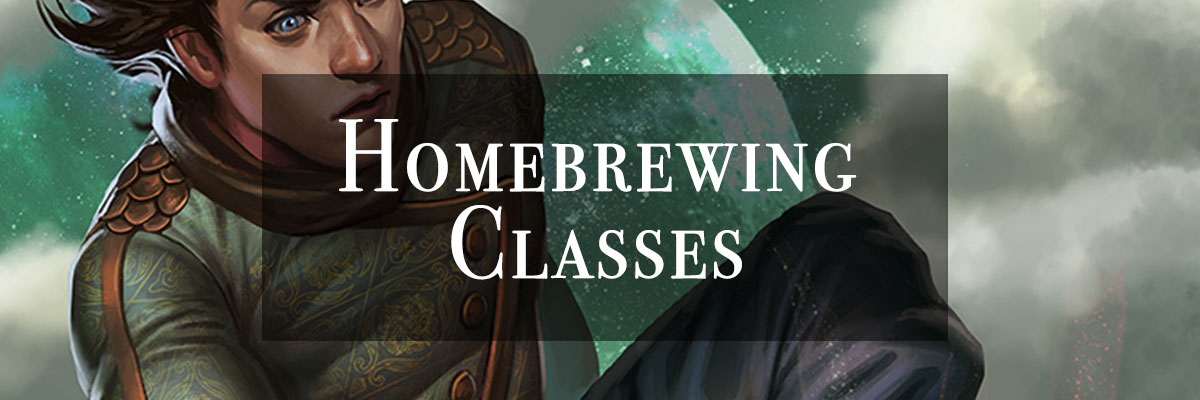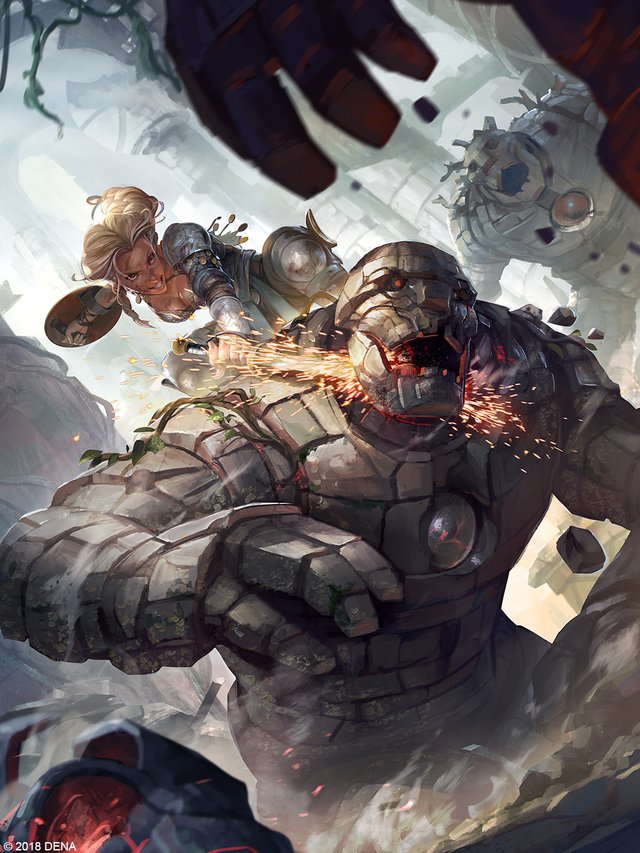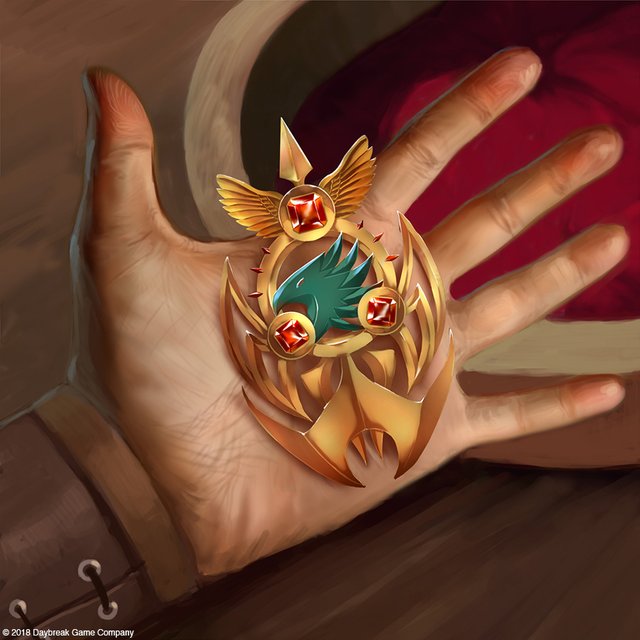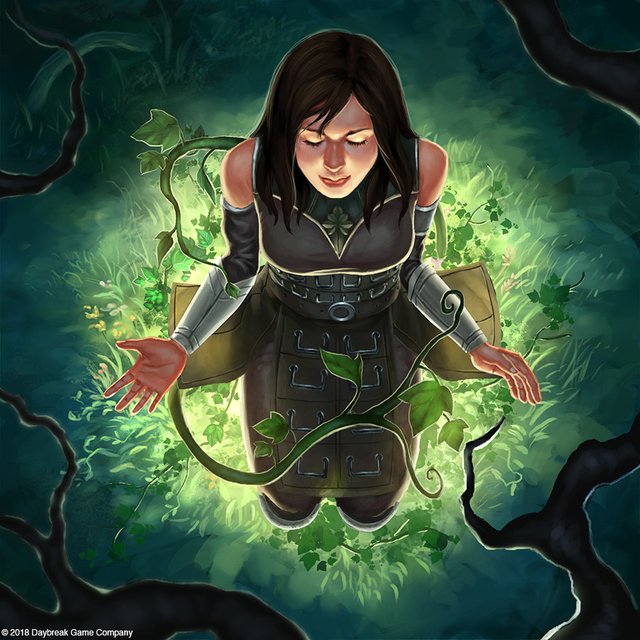Homebrewing Classes


Image credit 2018 DeNA – Produced by Conceptopolis/Jetpack7
#Homebrew. An endless pit of creativity and anxiety revolving around making up stuff for you and your friends. That could be an oversimplification, but that’s how I always end up viewing it.
In reality, though it is that simple. Maybe it’s because I’m a very nerdy individual and fill my life up with things such as anime, video games, thick fantasy novels, and the like but finding inspiration for creating #classes in#Dungeons&Dragons tends to hit me out of the blue. I generally homebrew for my own personal games so there’s never any real-world pressure to complete what I set out to design, but since I enjoy it so much I usually end up speeding through the creation process regardless because I want to see my designs in action. Nevertheless, my designs and anyone’s really, start with a simple thought.
Idea
When I first begin creating custom classes for Dungeons and Dragons, my designs usually stemmed from one of two questions:
- How would an existing concept from a separate fictional/fantasy source function in D&D?
- Could I make a class spun from a specific mechanic already in the game?

Image credit 2018 Fantasy Flight – Produced by Conceptopolis/Jetpack7
For the former, it was easy to just take a character from another work of fiction or fantasy and make them into a player character with an appropriate race and class combo. While this is fun, the more I began running the game the more I began to wonder if I could push an idea passed the boundaries of what was present in the game. Sure an #elffighter may be able to represent the character that I saw as Jedi, but why not create an actual #Jedi?
In regards to the latter, the more I played the game and began understanding the mechanics, the more I wondered if it would be possible to create a class that was based on one mechanic, or even the opposite of a mechanic. Martial classes tend to have large hit dice, so why not create a class that has the smallest? #Clerics with divine magic are the primary healers, so why not create a healer that uses no #magic at all?
Writing It Down
Once the idea takes root in my mind I have to get it written down as soon as possible. Whether that’s on pen and paper, typed up, or even just on my phone, it has to get out. If I don’t do that, the idea will likely die and I’ll forget about it. This can be such an obnoxious hurdle to overcome because circumstance may just disagree with my creativity. It can be as simple and having to make something to eat and BAM!- Idea is forgotten. Haste is a huge ally of mine in the initial steps of design; even just having the concept in a place where I can see it again and not having to rely on memory. However, once I have it in a physical form and at least a draft available to edit, the process becomes a breeze. Why? This is the part where being a Dungeon Master makes home brewing a class so exciting and fun for me.
Playtesting!
I have a very dedicated core group of players that are open to testing out a great deal of the classes and archetypes I create in the game. Through them, I’m able to see my classes in action and directly note what works and what doesn’t. This, personally, is where the editing becomes a blast. Yes I receive critiques, yes some of my content isn’t balanced at first, yes some of it completely fails and has to be scrapped. But more importantly, it’s new content that my players have never seen. Creating something that they get to pioneer and help edit gives me, and them, great joy and excitement, especially when they appear to really dig into the class and its mechanics and start to find synergies within the rules of the game. This isn’t always the case, however, and brings me to one of the hardest aspects of home brewing classes, or any #Dungeons and #Dragons content that I give to my #players.
Trust
While I have a dedicated group of players that are excited to experiment with my creations, I realize this isn’t the case for all players and Dungeon Masters. When I speak of trust, though, I’m not referencing having players I can trust to honestly #playtest my content, or even having trust that my idea won’t be stolen. When I speak of trust, I’m talking about trusting myself. No matter how refined I think my idea is or how interesting the concept is to me, putting it out there and letting it be vulnerable is never easy. Trusting myself to be able to handle that and deal with the potential criticism in a positive way is my biggest hurdle when it comes to home brewing classes.

Image credit 2018 SOE – Produced by Conceptopolis/Jetpack7
A part of me thinks putting my designs out there requires a bit of blind confidence or even recklessness. The longer I wait and ruminate on my homebrew idea, the more likely I am to think it’s not worth trying out. So once I have a draft, one that may be rougher than sandpaper, giving it to my players to experiment with quickly and brazenly helps keep the momentum going and something to work on besides any doubt I may have had. Critiques from my players help me see my designs in ways I couldn’t have and give it more rounded improvements, something I think is critical to making truly playable classes.
Bringing it all home
Homebrewing classes is an absolute blast. Even more so due to my players being as willing as they are to take my designs and give them legs. I don’t do it because anyone asks me or because I feel like I need to. I do it because it gives my game a unique flavor for my playgroup. It gives them something to look forward to and something for me to work toward that makes our experience at the table special to us and only us. Even when my designs go beyond my table, my players and I will always remember where they started.
I hope anyone reading this with designs they want to share does just that. It’s nerve-wracking at times, but once you take that leap, even if it’s met with criticism, it can only improve and evolve into something that’s wholly yours. And I don’t think that’s just an oversimplification.

Hunter Henrickson
Actor, Gamer, Dungeon Master, Cleric-in-Training
Hunter is an actor who was introduced to D&D when he was 23 but quickly fell in love with the roleplaying and worldbuilding aspects of the game. Taking on multiple roles and personalities as a dungeon master fed right into his love of acting and that, combined with the engaging tactical elements of the game, let him create worlds for he and his friends to explore. He hasn’t looked back since.
1 Comment
Leave a Reply
Homebrewing Classes


Image credit 2018 DeNA – Produced by Conceptopolis/Jetpack7
#Homebrew. An endless pit of creativity and anxiety revolving around making up stuff for you and your friends. That could be an oversimplification, but that’s how I always end up viewing it.
In reality, though it is that simple. Maybe it’s because I’m a very nerdy individual and fill my life up with things such as anime, video games, thick fantasy novels, and the like but finding inspiration for creating #classes in#Dungeons&Dragons tends to hit me out of the blue. I generally homebrew for my own personal games so there’s never any real-world pressure to complete what I set out to design, but since I enjoy it so much I usually end up speeding through the creation process regardless because I want to see my designs in action. Nevertheless, my designs and anyone’s really, start with a simple thought.
Idea
When I first begin creating custom classes for Dungeons and Dragons, my designs usually stemmed from one of two questions:
- How would an existing concept from a separate fictional/fantasy source function in D&D?
- Could I make a class spun from a specific mechanic already in the game?

Image credit 2018 Fantasy Flight – Produced by Conceptopolis/Jetpack7
For the former, it was easy to just take a character from another work of fiction or fantasy and make them into a player character with an appropriate race and class combo. While this is fun, the more I began running the game the more I began to wonder if I could push an idea passed the boundaries of what was present in the game. Sure an #elffighter may be able to represent the character that I saw as Jedi, but why not create an actual #Jedi?
In regards to the latter, the more I played the game and began understanding the mechanics, the more I wondered if it would be possible to create a class that was based on one mechanic, or even the opposite of a mechanic. Martial classes tend to have large hit dice, so why not create a class that has the smallest? #Clerics with divine magic are the primary healers, so why not create a healer that uses no #magic at all?
Writing It Down
Once the idea takes root in my mind I have to get it written down as soon as possible. Whether that’s on pen and paper, typed up, or even just on my phone, it has to get out. If I don’t do that, the idea will likely die and I’ll forget about it. This can be such an obnoxious hurdle to overcome because circumstance may just disagree with my creativity. It can be as simple and having to make something to eat and BAM!- Idea is forgotten. Haste is a huge ally of mine in the initial steps of design; even just having the concept in a place where I can see it again and not having to rely on memory. However, once I have it in a physical form and at least a draft available to edit, the process becomes a breeze. Why? This is the part where being a Dungeon Master makes home brewing a class so exciting and fun for me.
Playtesting!
I have a very dedicated core group of players that are open to testing out a great deal of the classes and archetypes I create in the game. Through them, I’m able to see my classes in action and directly note what works and what doesn’t. This, personally, is where the editing becomes a blast. Yes I receive critiques, yes some of my content isn’t balanced at first, yes some of it completely fails and has to be scrapped. But more importantly, it’s new content that my players have never seen. Creating something that they get to pioneer and help edit gives me, and them, great joy and excitement, especially when they appear to really dig into the class and its mechanics and start to find synergies within the rules of the game. This isn’t always the case, however, and brings me to one of the hardest aspects of home brewing classes, or any #Dungeons and #Dragons content that I give to my #players.
Trust
While I have a dedicated group of players that are excited to experiment with my creations, I realize this isn’t the case for all players and Dungeon Masters. When I speak of trust, though, I’m not referencing having players I can trust to honestly #playtest my content, or even having trust that my idea won’t be stolen. When I speak of trust, I’m talking about trusting myself. No matter how refined I think my idea is or how interesting the concept is to me, putting it out there and letting it be vulnerable is never easy. Trusting myself to be able to handle that and deal with the potential criticism in a positive way is my biggest hurdle when it comes to home brewing classes.

Image credit 2018 SOE – Produced by Conceptopolis/Jetpack7
A part of me thinks putting my designs out there requires a bit of blind confidence or even recklessness. The longer I wait and ruminate on my homebrew idea, the more likely I am to think it’s not worth trying out. So once I have a draft, one that may be rougher than sandpaper, giving it to my players to experiment with quickly and brazenly helps keep the momentum going and something to work on besides any doubt I may have had. Critiques from my players help me see my designs in ways I couldn’t have and give it more rounded improvements, something I think is critical to making truly playable classes.
Bringing it all home
Homebrewing classes is an absolute blast. Even more so due to my players being as willing as they are to take my designs and give them legs. I don’t do it because anyone asks me or because I feel like I need to. I do it because it gives my game a unique flavor for my playgroup. It gives them something to look forward to and something for me to work toward that makes our experience at the table special to us and only us. Even when my designs go beyond my table, my players and I will always remember where they started.
I hope anyone reading this with designs they want to share does just that. It’s nerve-wracking at times, but once you take that leap, even if it’s met with criticism, it can only improve and evolve into something that’s wholly yours. And I don’t think that’s just an oversimplification.

Hunter Henrickson
Actor, Gamer, Dungeon Master, Cleric-in-Training
Hunter is an actor who was introduced to D&D when he was 23 but quickly fell in love with the roleplaying and worldbuilding aspects of the game. Taking on multiple roles and personalities as a dungeon master fed right into his love of acting and that, combined with the engaging tactical elements of the game, let him create worlds for he and his friends to explore. He hasn’t looked back since.
1 Comment
-
SirLucien on March 5, 2019 at 10:45 am
Nice write up, short and concise, well done.

Nice write up, short and concise, well done.